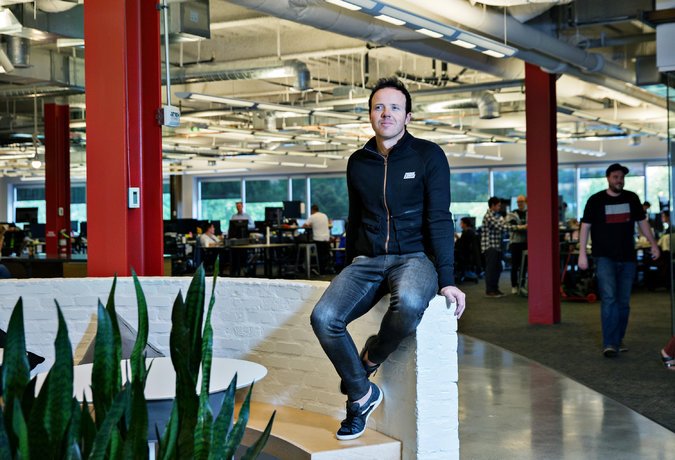“Founders viewed their companies like they’re building the family business or a farm — they’re building them to keep,” said Ryan Smith, the founder of Qualtrics, a data analytics company that focuses on surveys and other research for corporate and academic clients. “With no outside funding, there’s no lifeline and you have to figure it out on your own.”
Advertisement
Continue reading the main story
One reason for the growth, said Mark Gorenberg, a venture capitalist with Zetta Venture Partners in San Francisco, is the emphasis that some start-ups have placed on data analytics — a growing field that has helped put the state on the map. E-commerce companies, as well as those specializing in medical devices and cloud computing, have also flourished.
As the local tech community has grown, local venture capital firms have formed in the state, providing seed money as well as participating in later funding rounds. According to CB Insights, more than $2.6 billion has been invested in the 10 most well-funded companies in Utah.
“The region transformed from a recreation area with some tech companies to a full tech ecosystem,” said Mr. Gorenberg, whose firm has invested in three Utah-based companies.
In a state where 59 percent of residents describe themselves as active Mormons, the Church of Jesus Christ of Latter-day Saints has a presence in the start-up scene as well. Many company founders are members, and while the church does not directly invest in individual companies, said Doug Andersen, a spokesman for the church, the emphasis on family permeates many start-ups in the area.
Some say the Mormon culture fosters a collaborative spirt among the area’s tech community, and the founders of unicorns regularly get together. Last month, for example, several founders worked until 3 a.m. at Mr. Smith’s home, organizing a January conference meant to coincide with the Sundance Film Festival in Utah — an effort to create a tech and entertainment conference similar to the annual South by Southwest festival in Austin, Tex.

Mr. Smith’s father, Scott, started Qualtrics in 2002 to help businesses measure customer and client satisfaction; the younger Mr. Smith joined the nascent company while an undergraduate at Brigham Young University after doctors diagnosed cancer in his father (who has since recovered). His older brother Jared, an executive at Google, joined several years later.
The company, which has received funding from Accel Partners, Sequoia Capital and Insight Venture Partners, now has a valuation of $2.5 billion. Mr. Smith said it had annual revenue above $250 million, with corporate clients including Microsoft and Marriott International.
At Pluralsight, a company focusing on tech training, the trajectory was similar. Aaron Skonnard, its chief executive, founded the company with three others, each putting in $5,000 to initially develop in-person training programs.
Advertisement
Continue reading the main story
The four traveled worldwide for their programs until Mr. Skonnard realized that it would be more efficient to train clients online; by 2011, the company had begun offering only virtual training, walking away from half of its $1.5 million in revenue. But the switch paid off. Pluralsight began receiving outside funding in 2012 from venture capital firms such as Insight Venture and Iconiq Capital. The company, now valued at more than $1 billion, estimated that revenues will reach $190 million this year.
Only Domo, which Mr. James founded in 2010, has had a more typical trajectory. His track record at Omniture, which went public in 2006 and was later purchased by Adobe for $1.8 billion, allowed him to secure outside financing more quickly. Domo, which provides a cloud-based platform for executives to gain access to a range of data, has received roughly $684 million in funding from investors including BlackRock, Greylock Partners and Benchmark Capital.
Newsletter Sign Up
Continue reading the main story
Thank you for subscribing.
An error has occurred. Please try again later.
You are already subscribed to this email.
Now, the start-ups are dealing with the challenges to growth that others in tech face: recruiting new engineers and programmers, as well as seasoned executives.
It is one area where the companies outwardly compete, especially as they seek to improve their diversity. And the hiring needs can be significant. Pluralsight, for example, this month announced plans to add 2,400 new jobs over the next decade and move from Farmington to a new campus south of Salt Lake City, closer to the other tech companies.
The local universities have played an important role in fostering homegrown talent. Brigham Young, the private university affiliated with the Mormon Church, and the public University of Utah have programs intended to develop young entrepreneurs.
But as demand for talent has grown, it has also meant companies have needed to recruit outside Utah.


Their pitch often involves promoting the accessibility of outdoor activities, including hiking and skiing. Jaunts to Park City, the ski town, are common, and many choose to settle in that area. Besides, the office spaces of many of these companies typify the start-up ethos: abundant food, table tennis and pool tables, and, at Qualtrics, even an indoor basketball court.
The companies emphasize their philanthropic efforts. Pluralsight, for example, recently pledged $10 million for computer science education. Qualtrics is spending at least $10 million over three years to sponsor the Utah Jazz basketball team’s jerseys, which, in lieu of its corporate brand, will display the logo for “5 for the Fight,” the company’s global effort to encourage cancer research donations.
The companies also talk up the growth of their competitors, to assure recruits that many opportunities exist within the state if an employee — at any level — wants to make a move. There are more than 4,000 tech companies in the state, according to figures from the governor’s office; Mr. James, who employs 810 people at Domo, sometimes suggests that those interviewing speak to others in the region.
“I want them to know that re-deployability isn’t an issue,” he said.
The efforts have paid off, Mr. Smith said. This year alone, his company has hired 150 people who moved from outside the state.
Advertisement
Continue reading the main story
Joy Driscoll Durling, the chief information and digital enablement officer at Vivint Smart Home, was working at Adobe in California when she had the opportunity to move to Utah, where Adobe established offices after its acquisition of Omniture.
“No one in my family could believe I was even considering it,” she said, “but my family and I appreciate the outdoors.”
And while they briefly considered returning to the Bay Area, they have stayed because of both work-life balance and the career opportunities. In March, Ms. Durling left Adobe and joined Vivint, which provides home security and automation products.
Apart from lifestyle, the potential for an initial public offering helps with recruiting — and legitimacy. Farrah Kim, a spokeswoman for CB Insights, said the best “way to jump-start a start-up ecosystem is for a cluster of big exits to emerge,” whether through deals or I.P.O.s.
Four of the unicorns are considering I.P.O.s, according to the founders, although none would talk about specific plans. The choppy performance of the recent I.P.O.s of Snap and Blue Apron has not appeared to deter them. (Last month, The Wall Street Journal reported that Blackstone, which owns Vivint Home, plans to pursue either an I.P.O. or a merger for the company. Representatives of both Blackstone and Vivint declined to comment.)
The public markets afford companies more capital for growth, whether organic or through acquisitions, Mr. James said. And, he added, an I.P.O. enhances a company’s profile because it shows that the business has been vetted by bankers and lawyers.
“One day, people think you’re a cute entrepreneur,” he said. “But you’re treated dramatically different once you’re public.”
Continue reading the main story
Article source: https://www.nytimes.com/2017/10/11/business/smallbusiness/tech-start-ups-utah.html?partner=rss&emc=rss
Speak Your Mind
You must be logged in to post a comment.